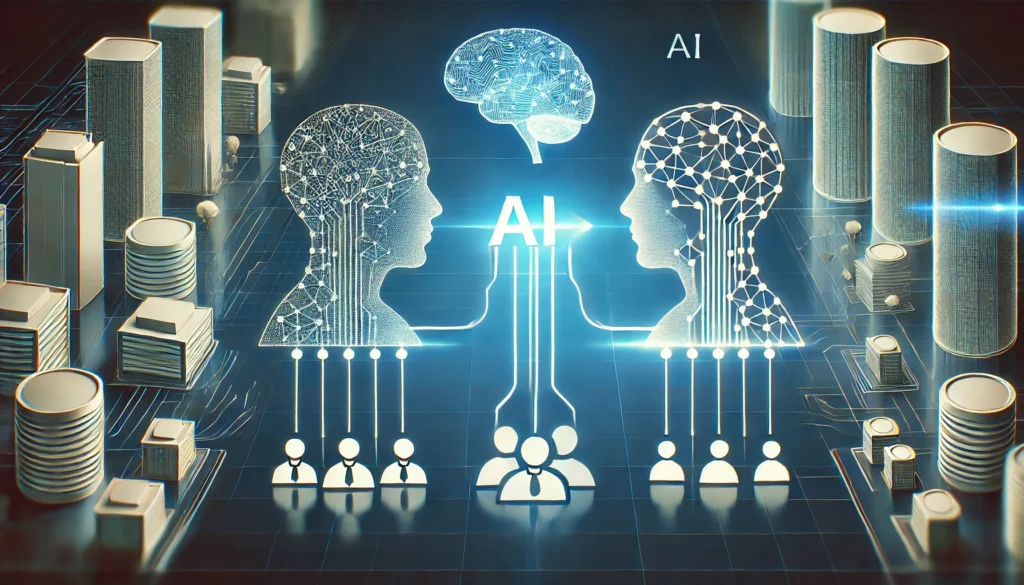The Real-World Power of AI in Business: More Than Just Hype
Let’s face it—AI is no longer a “someday” technology. It’s not stuck in science fiction or buried in academic papers. AI in business it’s right here, in the thick of our everyday business world, and it’s completely reshaping how companies operate, grow, and stay competitive.
Whether you’re running a tech startup or managing a legacy enterprise, artificial intelligence isn’t just a tool—it’s a force. It’s the kind of innovation that changes the rules mid-game. So, if you’re curious about how it’s all going down in boardrooms and brainstorms, let’s break it down together.
AI in Business: What’s the Big Deal?
So, what does AI really bring to the table? More than you might think.
According to Microsoft’s Work Trend Index, a massive 85% of senior executives believe AI will help their companies thrive—not just survive. But we’re not talking about simple automation or data crunching here. Today’s AI can process complex language, learn from patterns, adapt to new data, and even predict future trends.
Imagine this: your sales data isn’t just sitting in a spreadsheet—it’s being analyzed by an AI system that can highlight what products are likely to spike in demand next month. Or customer support chatbots that actually get what people are saying and respond like a human—minus the wait time and coffee breaks.
That’s the magic we’re talking about.
Meet the Frontier Firms: The AI Pioneers
Ever wonder who’s actually leading this AI revolution? There’s a term for them—Frontier Firms. These are the companies that don’t just experiment with AI—they live and breathe it. Think Google, Amazon, Microsoft, and other trailblazers that are using AI to reshape everything from advertising to medical breakthroughs.
What sets them apart? It’s not just the tech. It’s their mindset. These companies have committed deeply to integrating AI across the board—from internal workflows to customer-facing tools. And that commitment is paying off big time.
Work, Reinvented: How AI Is Reshaping Productivity
Let’s be honest: most of us could use a few more hours in the day. One of AI’s biggest perks? It frees up time by automating repetitive, low-value tasks. Emails, data entry, inventory predictions, customer queries—you name it, AI can likely handle it.
In fact, a recent report revealed that AI could help streamline around 64% of day-to-day work activities. That’s not just saving time—it’s opening the door for employees to focus on the creative, strategic, and people-driven work that truly adds value.
You’re not being replaced by robots—you’re getting reinforcements.
Digital Labor: Your Newest (and Smartest) Hire
Now here’s a phrase you’ll hear more often: digital labor.
It’s not science fiction—it’s the idea of building a workforce that includes both humans and AI systems. For example, imagine an AI tool that tracks customer behavior in real time and adjusts your marketing campaign before you’ve even had your morning coffee. Or another one that helps designers forecast product trends based on social media buzz.
It’s like giving your team a squad of silent, tireless assistants who never clock out.
AI Isn’t Taking Jobs—It’s Creating Them
There’s a lot of fear out there about AI replacing people. But here’s the twist: AI is also creating brand-new roles that didn’t exist a few years ago. From AI ethics consultants to machine learning engineers to prompt designers—this new wave of jobs is focused on guiding, refining, and collaborating with artificial intelligence.
And yes, it means reskilling and upskilling are more important than ever. But companies that invest in their people now will be better prepared for a future where human creativity and machine intelligence work hand in hand.
Final Thoughts: The Future Is Already Here
So what’s the big takeaway? AI is not just some futuristic buzzword—it’s happening now, and it’s reshaping businesses in ways we’re only starting to understand.
The companies that embrace AI aren’t just staying ahead—they’re redefining what success looks like. From productivity boosts to smarter customer experiences and new types of jobs, AI is no longer optional. It’s essential.
And if you’re just starting to explore how it fits into your strategy, don’t worry—you’re not late to the party. The most important thing is to start somewhere. Learn what tools fit your needs, get your team onboard, and keep your eyes open for how AI can help you work smarter—not harder.
The future of business? It’s intelligent, it’s agile, and yes—it’s powered by AI.


